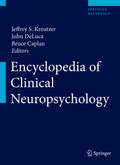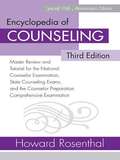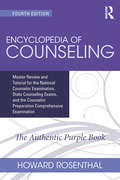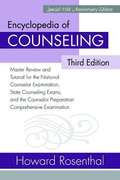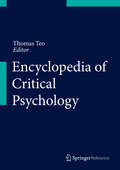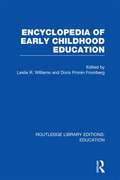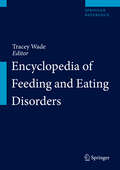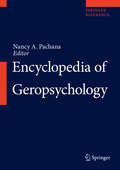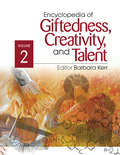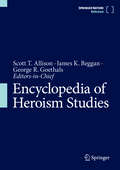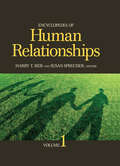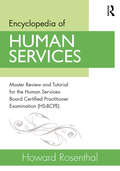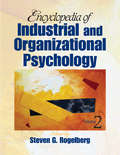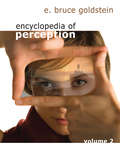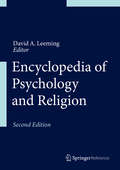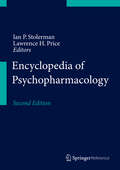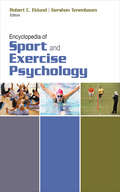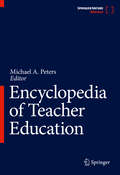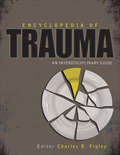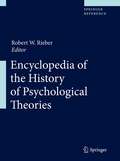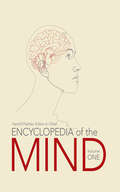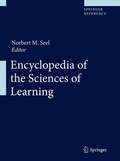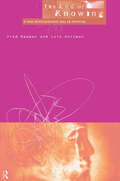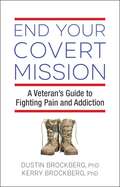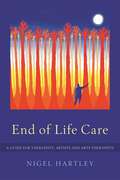- Table View
- List View
Encyclopedia of Clinical Neuropsychology
by Bruce Caplan Jeffrey Kreutzer John DelucaThis encyclopedia serves as a unified, comprehensive reference for professionals involved in the diagnosis, evaluation, and rehabilitation of adult patients and children with neuropsychological disorders. It addresses psychological, psychosocial, and psychiatric aspects of an array of neurological disorders, emphasizing treatment and rehabilitation, not just assessment and diagnosis.
Encyclopedia of Counseling
by Howard RosenthalIn the third edition of Howard Rosenthal's best-selling test preparation guide for the National Counselor Examination (NCE), students get more help than ever with an expanded section on marriage and family counseling, new material on web counseling, and updated material throughout. This resource now includes over 1,050 tutorial questions/answers and a new "Final Review and Last Minute Super Review Boot Camp" section. This guide is an ideal review tool for state licensing, the NCC credential, and preparation for written and oral boards. And because the new Counselor Preparation Comprehensive Examination (CPCE), draws from the same subject areas, the Encyclopedia is a perfect study guide for the CPCE as well. Written in a unique question/answer format, with a quick reference index, this is also an essential student reference volume for use in any counseling, social work, or human services course. Download the accompanying app today! This effective, authoritative and easy-to-use exam preparation app offers over 300 questions to help you revise for, and pass, the National Counselor Examination (NCE) and the Counselor Preparation Comprehensive Examination (CPCE). Howard Rosenthal's best-selling test preparation guides have helped thousands of students pass the NCE and CPCE. In this accompanying app, test-takers will find more than 300 interactive multiple-choice questions (and detailed answers), including nearly 50 brand-new questions and answers and a summary of the October 2012 changes to the test. For Apple/iOS | For Android
Encyclopedia of Counseling: Master Review and Tutorial for the National Counselor Examination, State Counseling Exams, and the Counselor Preparation Comprehensive Examination
by Howard RosenthalWith more questions and answers than any other edition, the Encyclopedia of Counseling, Fourth Edition, is still the only book you need to pass the NCE, CPCE, and other counseling exams. Every chapter has new and updated material and is still written in Dr. Rosenthal's lively, user-friendly style counselors know and love. The book’s new and improved coverage incorporates a range of vital topics, including social media, group work in career counseling, private practice and nonprofit work, addictions, neurocounseling, research trends, the DSM-5, the new ACA and NBCC codes of ethics, and much, much more.
Encyclopedia of Counseling: Master Review and Tutorial for the National Counselor Examination, State Counseling Exams, and the Counselor Preparation Comprehensive Examination (Third Edition)
by Howard RosenthalIn the third edition of Howard Rosenthal's best-selling test preparation guide for the National Counselor Examination (NCE), students get more help than ever with an expanded section on marriage and family counseling, new material on web counseling, and updated material throughout. This resource now includes over 1,050 tutorial questions/answers and a new "Final Review and Last Minute Super Review Boot Camp" section. This guide is an ideal review tool for state licensing, the NCC credential, and preparation for written and oral boards. And because the new Counselor Preparation Comprehensive Examination (CPCE), draws from the same subject areas, the Encyclopedia is a perfect study guide for the CPCE as well. Written in a unique question/answer format, with a quick reference index, this is also an essential student reference volume for use in any counseling, social work, or human services course.
Encyclopedia of Critical Psychology
by Thomas TeoEncyclopedia of Critical Psychology is a comprehensive reference work and is the first reference work in English that comprehensively looks at psychological topics from critical as well as international points of view. Thus, it will appeal to all committed to a critical approach across the Encyclopedia of Critical Psychology, for alternative analyses of psychological events, processes, and practices. The Encyclopedia of Critical Psychology provides commentary from expert critical psychologists from around the globe who will compose the entries. The Encyclopedia of Critical Psychology will feature approximately 1,000 invited entries, organized in an easy to use A-Z format. The encyclopedia will be compiled under the direction of the editor who has published widely in the field of critical psychology and due to his international involvements is knowledgeable about the status of critical psychology around the world. The expert contributors will summarize current critical-psychological knowledge and discuss significant topics from a global perspective.
Encyclopedia of Early Childhood Education (Routledge Library Editions: Education)
by Doris Pronin Fromberg Leslie R. WilliamsThis Encyclopedia is a reference work about young children in the USA, designed for use by policy makers, community planners, parents of young children, teacher and early childhood educators, programme and school administrators, among others. The field of early childhood education has been affected by changes taking place in the nation’s economy, demographics, schools, communities and families that influence political and professional decisions. These diverse historical, political economic, socio-cultural, intellectual and educational influences on early childhood education have hindered the development of a clear definition of the field. The Encyclopedia provides an opportunity to define the field against the background of these influences and relates the field of early childhood education to its diverse contexts and to the cultural and technological resources currently affecting it.
Encyclopedia of Feeding and Eating Disorders
by Tracey WadeThe field of feeding and eating disorders represents one of the most challenging areas in mental health, covering childhood, adolescent and adult manifestations of the disorders and requiring expertise in both the physical and psychological issues that can cause, maintain, and exacerbate these disorders. The scope of the book is an overview of all the feeding and eating disorders from "bench to bedside", incorporating recent changes introduced into the Diagnostic and Statistical Manual of Mental Disorders, Fifth Edition (DSM-5). The aim is to present one of the first complete overviews of the newly defined area of feeding and eating disorders with respect to genetics, biology and neuroscience through to theory and its application in developing clinical approaches to the prevention and treatment of feeding and eating disorders.
Encyclopedia of Geropsychology
by Nancy A. PachanaThis encyclopedia brings together key established and emerging research findings in geropsychology. It is a comprehensive coverage of the entire breadth of the field, giving readers access to all major subareas and illustrating their interconnections with other disciplines. Entries delve deep into key areas of geropsychology such as perception, cognition, clinical, organizational, health, social, experimental and neuropsychology. In addition to that, the encyclopedia covers related disciplines such as neuroscience, social science, population health, public policy issues pertaining to retirement, epidemiology and demography and medicine. Paying careful attention to research internationally, it cites English and non-English empirical literature from around the globe. This encyclopedia is relevant to a wide audience that include researchers, clinicians, students, policy makers and nongovernmental agencies.
Encyclopedia of Giftedness, Creativity, and Talent
by Barbara A. KerrLibrary Journal Best Reference 2009Educators have begun to recognize that identifying and accommodating students who are slower to learn may leave behind those who learn rapidly and think creatively. The nature of intelligence, the sources of innovation, and the ways to nurture special abilities are now topics of great interest to scholars in a wide variety of disciplines and to the general public. Policymakers, ranging from school board members to leaders of nations, must also make practical decisions about how communities and societies will treat their brightest, most promising students.With more than 400 entries, these two volumes review research findings on giftedness, talent, and creativity and their effect on education, training, science and the arts, government policy, and everyday life. The Encyclopedia of Giftedness, Creativity, and Talent provides a balanced, objective assessment of the various perspectives on the nature of intelligence, innovation, and optimal states. This state-of-the-art resource covers all major facets of the field, including achievement motivation, artistic ability, creative personality, emotional intelligence, gender differences, genius, intelligence testing, learning styles, minority underrepresentation, multiple intelligences, musical ability, prodigies, scientists, self actualization, thinking skills, and more.Key ThemesAssessment and IdentificationCreativity StudiesCultural IssuesEducationEminent PeopleExceptionalitiesIntelligenceNeuroscience and GeneticsPopulationsPrograms and InterventionsPsychological IssuesTalent DomainsTheories and ModelsKey FeaturesProvides a balanced and critical discussion of the controversies that have animated research and theory makingClarifies which grouping and instructional strategies promote the best outcomes in achievement and social/emotional development of gifted childrenHelps educators make informed decisions about the identification strategies and the curriculum models that best meet their students' needsContains thousands of pertinent facts from the fields of education, psychology, sociology, and the artsEvaluates policies that have hindered gifted children and makes a persuasive case for appropriately challenging and differentiated educationExamines how giftedness, creativity, and talent were defined in the past and how current meanings have emerged.
Encyclopedia of Heroism Studies
by George R. Goethals Scott T. Allison James K. BegganThis reference work is an important resource in the growing field of heroism studies. It presents concepts, research, and events key to understanding heroism, heroic leadership, heroism development, heroism science, and their relevant applications to businesses, organizations, clinical psychology, human wellness, human growth potential, public health, social justice, social activism, and the humanities. The encyclopedia emphasizes five key realms of theory and application: Business and organization, focusing on management effectiveness, emotional intelligence, empowerment, ethics, transformational leadership, product branding, motivation, employee wellness, entrepreneurship, and whistleblowers; clinical-health psychology and public health, focusing on stress and trauma, maltreatment, emotional distress, bullying, psychopathy, depression, anxiety, family disfunction, chronic illness, and healthcare workers’ wellbeing; human growth and positive psychology, discussing altruism, authenticity, character strengths, compassion, elevation, emotional agility, eudaimonia, morality, empathy, flourishing, flow, self-efficacy, joy, kindness, prospection, moral development, courage, and resilience; social justice and activism, highlighting anti-racism, anti-bullying, civil disobedience, civil rights heroes, climate change, environmental heroes, enslavement heroes, human rights heroism, humanitarian heroes, inclusivity, LGBTQ+ heroism, #metoo movement heroism, racism, sustainability, and women’s suffrage heroes; and humanities, relating to the mythic hero’s journey, bliss, boon, crossing the threshold, epic heroes, fairy tales, fiction, language and rhetoric, narratives, mythology, hero monomyth, humanities and heroism, religious heroes, and tragic heroes.
Encyclopedia of Human Relationships
by Harry T. Reis Susan SprecherLibrary Journal Best Reference 2009"An excellent gateway to further examination of any of the subdisciplines of relationship science, or as a research tool in its own right." —Library JournalRelationships are fundamental to nearly all domains of human activity, from birth to death. When people participate in healthy, satisfying relationships, they live, work, and learn more effectively. When relationships are distressed or dysfunctional, people are less happy, less healthy, and less productive. Few aspects of human experience have as broad or as deep effects on our lives.The Encyclopedia of Human Relationships offers an interdisciplinary view of all types of human associations—friends, lovers, spouses, roommates, coworkers, teammates, parents and children, cousins, siblings, acquaintances, neighbors, business associates, and so forth. Although each of these connections is unique in some respect, they share a common core of principles and processes. These three volumes provide a state-of-the-art review of the extensive theories, concepts, and empirical findings about human relationships.Key FeaturesCompiles leading-edge information about how people think, feel, and act toward each otherPresents the best in the field—authors who have contributed significant scientific knowledge about personal relationships over the past several decades.Offers a diverse approach to relationship science with contributions from psychology, sociology, communication, family studies, anthropology, physiology, neuroscience, history, economics, and legal studiesKey Themes:Cognitive Processes in RelationshipsCommunication ProcessesCreating and Maintaining ClosenessDating, Courtship, and MarriageThe Dark Side of RelationshipsEmotion Processes in RelationshipsFamilyFriendship and Caregiving in AdulthoodHealth and the Biology of RelationshipsMethods for Studying RelationshipsPersonality and Individual DifferencesPrevention and Repair of Relationship ProblemsPsychological ProcessesSexualitySocial Context of RelationshipsSocial Relations in Childhood and AdolescenceTheoretical Approaches to Studying RelationshipsTypes of RelationshipsOur relationships influence virtually all aspects of our everyday existence and are of deep interest to students, researchers, academics, and laypeople alike. This Encyclopedia is an invaluable addition to any academic or public library.
Encyclopedia of Human Services: Master Review and Tutorial for the Human Services-Board Certified Practitioner Examination (HS-BCPE)
by Howard RosenthalDr. Howard Rosenthal, author of the best-selling counseling exam book of all time, the Encyclopedia of Counseling, has now created the Encyclopedia of Human Services: Master Review and Tutorial for the Human Services-Board Certified Examination (HS-BCPE). Helpers can read this book to snare the Human Services-Board Certified Practitioner (HS-BCP) credential to take their career to the next level! Dr. Rosenthal's unique, reader-friendly style actually makes exam prep enjoyable! Reads like a novel, but imparts information like a graduate text. Who else wants to say, "I passed!"?
Encyclopedia of Industrial and Organizational Psychology
by Steven G. RogelbergWith more than 400 entries, the Encyclopedia of Industrial and Organizational Psychology presents a thorough overview of the cross-disciplinary field of industrial and organizational psychology for students, researchers, and professionals in the areas of psychology, business, management, and human resources. In two volumes, readers are provided with state-of-the-art research and ready-to-use facts.
Encyclopedia of Perception
by E. Bruce GoldsteinThe field of perception is devoted to explaining the operation of the senses and the experiences and behaviors resulting from stimulation of the senses. Perceptual processes such as recognizing faces, seeing color, hearing music, and feeling pain represent the actions of complex mechanisms, yet we usually do them easily. The Encyclopedia of Perception presents a comprehensive overview of the field of perception through authoritative essays written by leading researchers and theoreticians in psychology, the cognitive sciences, neuroscience, and medical disciplines. It presents two parallel and interacting approaches: the psychophysical, or determining the relationship between stimuli in the environment and perception, and the physiological, or locating the biological systems responsible for perception. Are there any processes not associated with perception? Surely there are, but the pervasiveness of perception is truly impressive, and the phenomena of perception and its mechanisms are what this encyclopedia is about.Key FeaturesContains 16 pages of color illustration and photography to accompany the entriesOffers a varied and broad list of topics, including basic research as well as methodologies, theoretical approaches, and real-world applications of perceptual researchEmphasizes human perception but includes ample research because of its importance in its own right and because of what this research tells us about human perceptionWritten by recognized experts from many disciplines but for an audience with no previous background in perception—students and members of the general public alikeKey ThemesActionAttentionAuditionChemical SensesCognition and PerceptionComputers and PerceptionConsciousnessDisorders of PerceptionIllusory PerceptionsIndividual Differences (Human) and Comparative (Across Species; Not Including Ageing, Disorders, and Perceptual Development)MethodsPerceptual Development/ExperiencePhilosophical ApproachesPhysiological ProcessesSense InteractionSkin and Body SensesTheoretical ApproachesVisual Perception
Encyclopedia of Psychology and Religion
by David A. LeemingEncyclopedia of Psychology and Religion, 2nd edition, is a greatly expanded and updated reference work that builds on the foundation of the highly successful previous edition. The first to integrate psychology and religion in the context of modern social and behavioral sciences, Encyclopedia of Psychology and Religion continues to offer a rich contribution to the development of human self-understanding. A significant number of new entries and of updated original entries provide even more comprehensive coverage. This reference work provides a definitive and intellectually rigorous collection of psychological interpretations of the stories, rituals, motifs, symbols, doctrines, dogmas, and experiences of the world's religious and mythological traditions. A broad range of psychological approaches are used in order to help readers understand the form and content of religious experience as well as offer insight into the meanings of religious symbols and themes. It provides a technical and phenomenological vocabulary that will enable collaboration and dialogue among researchers in both fields. Easy to read and scrupulously edited, the encyclopedia draws from different religions, including modern world religions and older religious movements. It is of particular interest to researchers and professionals in psychology and religion.
Encyclopedia of Psychopharmacology
by Ian P. Stolerman Lawrence H. PricePsychopharmacology is the study of the effects of psychoactive drugs on the functioning of the central nervous system at all levels of analysis, thus embracing cognition, behavior, psychological states, neurophysiology, neurochemistry, gene expression, and molecular biology. It includes, as an integral part of its domain, the interaction of environmental and genetic factors with psychoactive drug action, the medicinal and social uses of drugs, and the misuse and abuse of psychoactive substances. The aim of this comprehensive encyclopedia is to provide detailed information on psychopharmacology and its sub-disciplines, such as clinical psychopharmacology, molecular neuropsychopharmacology, behavioral pharmacology in laboratory animals, preclinical psychopharmacology, and human experimental psychopharmacology. The wide-ranging entries in the Encyclopedia of Psychopharmacology are written by leading experts drawn from a broad diversity of backgrounds and areas of specialization. The entries, comprehensive but succinct, provide basic and clinical scientists in academia, as well as industry, with the most important and relevant information on recent developments in psychopharmacology and its closely allied disciplines. The essential information about the field contained in these entries is readily accessible to clinicians, scholars, students, teachers, and interested laypeople.
Encyclopedia of Sport and Exercise Psychology
by Gershon Tenenbaum Dr Robert C. EklundHow do athletes overcome fears, slumps, mental blocks, or injuries? How do they deal with stress and anxiety, be it from competitors, teammates, audiences, parents, coaches, or themselves? What psychological techniques prove effective in mental training for peak performance, maintaining concentration, motivation, and competitive drive? How can an athlete enhance his or her commitment to a training regimen, or how might the average person better adhere to a program of fitness and exercise? Readers will find answers to these questions and more in the Encyclopedia of Sport and Exercise Psychology. Features & Benefits: Entries explore the theory, research, and application of psychology as it relates to sport and fitness in a manner that is accessible and jargon-free to help readers better understand human behavior in sport and exercise settings. From personal factors to situational factors influencing performance to specific psychological techniques for enhancing performance, this work provides comprehensive coverage of the field via approximately 350 to 400 signed entries. Entries conclude with cross-references and suggestions for further readings to guide students further in their research journey. Available in print and online, this monumental work is edited by two leading figures in the field with a distinguished international Editorial Advisory Board to select and assign entries, ensuring authoritative content readers can trust.
Encyclopedia of Teacher Education
by Michael A. PetersThis encyclopaedia is a dynamic and living reference that student teachers, teacher educators, researchers and professionals in the field of education with an accent on all aspects of teacher education, including: teaching practice; initial teacher education; teacher induction; teacher development; professional learning; teacher education policies; quality assurance; professional knowledge, standards and organisations; teacher ethics; and research on teacher education, among other issues. The Encyclopedia is an authoritative work by a collective of leading world scholars representing different cultures and traditions, the global policy convergence and counter-practices relating to the teacher education profession. The accent will be equally on teaching practice and practitioner knowledge, skills and understanding as well as current research, models and approaches to teacher education.
Encyclopedia of Trauma: An Interdisciplinary Guide
by Charles R. FigleyTrauma is defined as a sudden, potentially deadly experience, often leaving lasting, troubling memories. Traumatology (the study of trauma, its effects, and methods to modify effects) is exploding in terms of published works and expanding in terms of scope. Originally a narrow specialty within emergency medicine, the field now extends to trauma psychology, military psychiatry and behavioral health, post-traumatic stress and stress disorders, trauma social work, disaster mental health, and, most recently, the subfield of history and trauma, with sociohistorical examination of long-term effects and meanings of major traumas experienced by whole communities and nations, both natural (Pompeii, Hurricane Katrina) and man-made (the Holocaust, 9/11). One reason for this expansion involves important scientific breakthroughs in detecting the neurobiology of trauma that is connecting biology with human behavior, which in turn, is applicable to all fields involving human thought and response, including but not limited to psychiatry, medicine and the health sciences, the social and behavioral sciences, the humanities, and law. Researchers within these fields and more can contribute to a universal understanding of immediate and long-term consequences–both good and bad–of trauma, both for individuals and for broader communities and institutions. Trauma encyclopedias published to date all center around psychological trauma and its emotional effects on the individual as a disabling or mental disorder requiring mental health services. This element is vital and has benefited from scientific and professional breakthroughs in theory, research, and applications. Our encyclopedia certainly will cover this central element, but our expanded conceptualization will include the other disciplines and will move beyond the individual.
Encyclopedia of the History of Psychological Theories
by Robert W. RieberThis work will survey the entire range of thinking in psychology, from ancient times to the present, encompassing philosophies and theories of mind that pre-date our modern conception of psychology as a science, and extending to the current findings of neuroscience. It will set the theories into their historical context and cross-reference key influences, such as Darwin's on Freud. Fifteen hundred entries will comprise key figures, theoretical concepts, false theories, historical events, and seminal writings. International in scope, this project will involve history of psychology experts from around the world and the coverage of topics will be set in global context. The aim will be to provide a reference work of more depth than discussions that are currently available in textbooks, with the ability to connect to a multitude of relevant topics. This work will provide a picture of psychology as it has emerged into the present time and position it among other related fields such as anthropology, sociology, philosophy, and medicine.
Encyclopedia of the Mind
by Harold PashlerIt's hard to conceive of a topic of more broad and personal interest than the study of the mind. In addition to its traditional investigation by the disciplines of psychology, psychiatry, and neuroscience, the mind has also been a focus of study in the fields of philosophy, economics, anthropology, linguistics, computer science, molecular biology, education, and literature. In all these approaches, there is an almost universal fascination with how the mind works and how it affects our lives and our behavior. Studies of the mind and brain have crossed many exciting thresholds in recent years, and the study of mind now represents a thoroughly cross-disciplinary effort. Researchers from a wide range of disciplines seek answers to such questions as: What is mind? How does it operate? What is consciousness?This encyclopedia brings together scholars from the entire range of mind-related academic disciplines from across the arts and humanities, social sciences, life sciences, and computer science and engineering to explore the multidimensional nature of the human mind.
Encyclopedia of the Sciences of Learning
by Norbert M. SeelOver the past century, educational psychologists and researchers have posited many theories to explain how individuals learn, i.e. how they acquire, organize and deploy knowledge and skills. The 20th century can be considered the century of psychology on learning and related fields of interest (such as motivation, cognition, metacognition etc.) and it is fascinating to see the various mainstreams of learning, remembered and forgotten over the 20th century and note that basic assumptions of early theories survived several paradigm shifts of psychology and epistemology. Beyond folk psychology and its naïve theories of learning, psychological learning theories can be grouped into some basic categories, such as behaviorist learning theories, connectionist learning theories, cognitive learning theories, constructivist learning theories, and social learning theories. Learning theories are not limited to psychology and related fields of interest but rather we can find the topic of learning in various disciplines, such as philosophy and epistemology, education, information science, biology, and - as a result of the emergence of computer technologies - especially also in the field of computer sciences and artificial intelligence. As a consequence, machine learning struck a chord in the 1980s and became an important field of the learning sciences in general. As the learning sciences became more specialized and complex, the various fields of interest were widely spread and separated from each other; as a consequence, even presently, there is no comprehensive overview of the sciences of learning or the central theoretical concepts and vocabulary on which researchers rely. The Encyclopedia of the Sciences of Learning provides an up-to-date, broad and authoritative coverage of the specific terms mostly used in the sciences of learning and its related fields, including relevant areas of instruction, pedagogy, cognitive sciences, and especially machine learning and knowledge engineering. This modern compendium will be an indispensable source of information for scientists, educators, engineers, and technical staff active in all fields of learning. More specifically, the Encyclopedia provides fast access to the most relevant theoretical terms provides up-to-date, broad and authoritative coverage of the most important theories within the various fields of the learning sciences and adjacent sciences and communication technologies; supplies clear and precise explanations of the theoretical terms, cross-references to related entries and up-to-date references to important research and publications. The Encyclopedia also contains biographical entries of individuals who have substantially contributed to the sciences of learning; the entries are written by a distinguished panel of researchers in the various fields of the learning sciences.
End Of Knowing: New Developmental Way Of Learning
by Fred Newman Lois HolzmanFirst published in 1997. Routledge is an imprint of Taylor & Francis, an informa company.
End Your Covert Mission: Fighting the Battle Against Addiction and Pain
by Dustin Brockberg Kerry BrockbergSpecialists give veterans the tools to conquer chronic pain and substance use in this to-the-point guide. For many veterans, life after military service includes what feels like an ongoing mission to disguise or ignore pain. Too often this mission is both secret and lonely—and undertaken without the support or even the knowledge of those around them. Some strategies to manage physical, social, and psychological pain are only short-term fixes. Self-medicating, substance use, and bottling up emotions don't work as part of civilian life. Written by professional practitioners in trauma, substance use disorder, pain management, and rehabilitation who are also members of the veteran community, End Your Covert Mission is an approachable, non-judgmental guide for stopping that self-imposed mission and developing solutions that lead to a healthier and happier life. The book includes features that help readers discover a path to recovery: - examples of the types of pain veterans may experience - language for admitting, describing, and sharing these various types of pain - personal stories from veterans - effective approaches for connecting with other veterans and family members - methods to address active substance use - ways to identify and manage risk factors for future substance use disorders
End of Life Care: A Guide for Therapists, Artists and Arts Therapists
by Nigel HartleyThe many unfounded myths and fears that surround working with people at the end of their lives are dispelled in this thoughtful book, and the authors provide both practical and emotional support for those involved in caring for dying patients. The book covers everything from the philosophy behind the practice to the diverse roles in the multi-disciplinary team, as well as current challenges and opportunities facing end of life care, with an emphasis on how therapy and arts therapies can be integrated effectively. It also looks at palliative care models that address all aspects of a patient's wellbeing and conveys the latest research and challenges in the field, bridging the gap between theory and the realities of working with patients on a daily basis. Using material from artists and therapists working in the field, the varying demands of inpatient, outpatient and home care are described, as well as the processes of bereavement, how to handle the practicalities of loss and the help that therapists can give at this stage. How artists and therapists with experience of working at the end of life can be involved in other areas of care such as supporting older people in care homes and those living with dementia is also discussed. The book also introduces the important area of health promotion, and how there is a growing responsibility to change people's attitudes towards death, dying and bereavement. Clear, practical examples are given as to how this might be achieved. Full of professional advice and career guidance, this book will be an invaluable tool for those working with patients nearing the end of life and those considering working in this area, as well as students in training.
